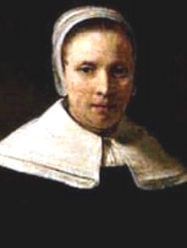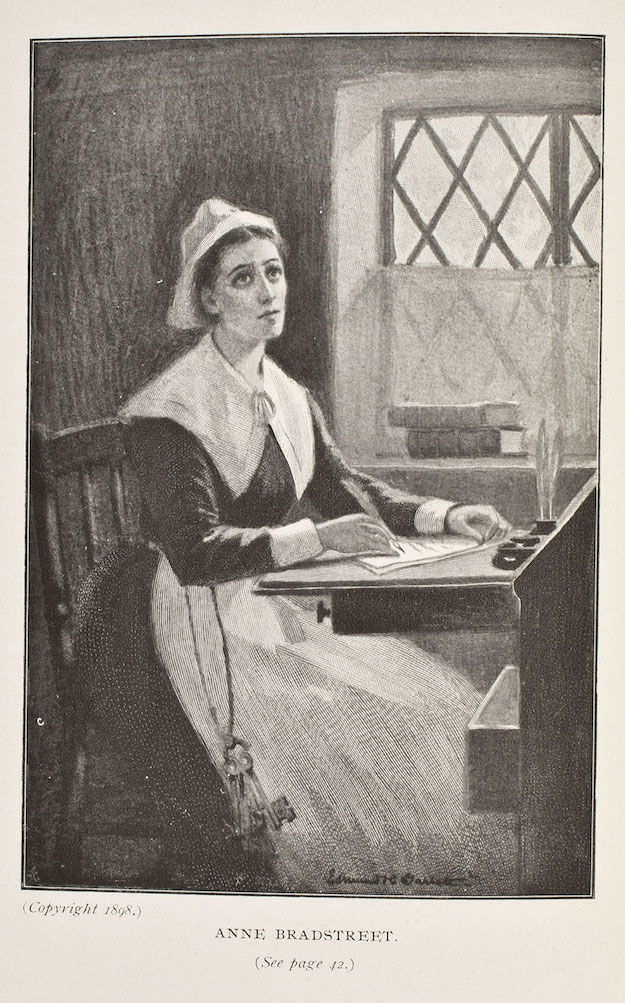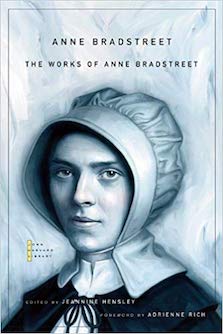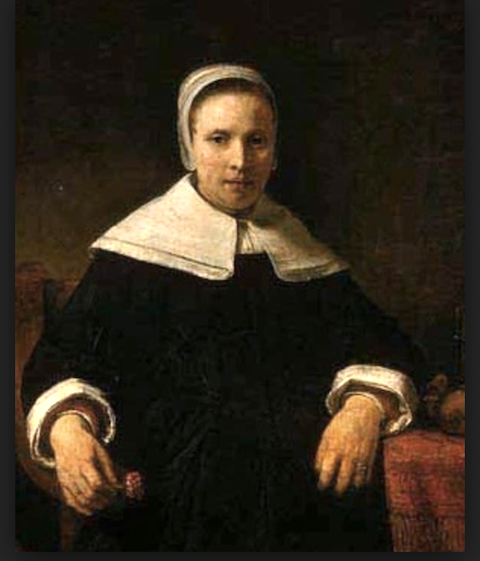Anne Bradstreet, Colonial American Poet
By Nava Atlas | On December 3, 2018 | Updated February 11, 2023 | Comments (0)

Anne Bradstreet (March 20, 1612 – September 16, 1672) was one of the most prominent early American poets, and the first writer in the American colonies to be published.
It was considered unacceptable for women of her time to write, but Anne rejected the prevailing notions of women’s inferiority. She was roundly criticized, not for the work itself, but for daring to make her work public.
Though Anne wrote sincerely and lovingly about her family, she also expressed her struggles as a woman and as a mother in her poetry.
Early life, leaving England for New England
Because she lived so long ago, not a lot of detail is known about Anne’s early life. Young Anne Dudley didn’t attend school, though she received a solid education from her book-loving father, Thomas Dudley.
During his year a steward at the estate of the Earl of Lincoln, she had access to the library, and read widely, especially from the classics: Plutarch, Pliny, Virgil, Suetonius, Homer, Ovid, Seneca, and others. She was also steeped in philosophy and Biblical studies.
While still living in her native England, Anne married the highly educated Simon Bradstreet in 1628 when she was sixteen years old.
That same year she contracted smallpox, and in her piety, she confessed to Pride and Vanity to the Lord that she worshipped. That, she believed, restored her to health. Two years later, she accompanied her husband and father to the new land. The three-month ocean voyage was a difficult one.
Along with her father, Anne Bradstreet and her husband Simon set off to New England in 1630. She was reluctant to give up the comfortable life of the manor for the wilderness of New England, but as a wife and daughter, she was obligated to follow. Their ship landed in Salem, Massachusetts, in July of 1630.
. . . . . . . . . .

This imagined image of Anne Bradstreet appeared in 1898
. . . . . . . . . .
Her faith helped her to endure
The family lived for a few years in Newtowne, or what is now Cambridge, MA, and then in Ipswich, before settling in what is now North Andover, Massachusetts. The Bradstreets endured many privations, but it was her faith that helped her endure — even as she struggled with some of its harsher tenets, like salvation and redemption.
In his sketch of Anne Bradstreet in Who Lived Here? (1952), M.A. De Wolfe wrote of what might have inspired her to pursue writing:
“What set Anne Bradstreet apart from most of the emigrating women was her exposure to books, the works of both earlier writers and of her own exciting contemporaries — and not only her exposure, but her response to it.
One thing to be remembered is that in the ruling class of the Bay Colony to which Anne Bradstreet belonged, the clergy held a powerful place, and that month the immigrants to New England even before 1640 there were about one hundred fifteen graduates of English University’s — chiefly ministers — and that seventy-four of these were in the Massachusetts Bay Colony.
Difficult, then, as the mere mechanics of living must have been for anybody of Anne Bradstreet’s tastes and gifts, she could feel that her voice … would find some sympathetic listeners not too far away.”
Wife, mother, and poet
Anne was always, from girlhood, in delicate health. Once safely settled in Massachusetts, she anxiously awaited the arrival of children.
The Son of Prayers, of vowes, of teares,
The childe I stay’d for many years.
She did manage to have eight children, and her love for them inspired her best-known lines (from “In Reference to Her Children, 23 June 1659)
I had eight birds hatch in one nest,
Four Cocks there were, and Hens the rest,
I nurst them up with pain and care,
Nor cost nor Labour did I spare,
Till at the last they felt their wing,
Mounted the Trees and learn’d to sing.
The poem continues on for many lines, celebrating each of her offspring.
Of her demanding life as a mother and her pull to express herself as a writer, The Poetry Foundation offers these insights:
“Although Bradstreet had eight children between the years 1633 and 1652, which meant that her domestic responsibilities were extremely demanding, she wrote poetry which expressed her commitment to the craft of writing. In addition, her work reflects the religious and emotional conflicts she experienced as a woman writer and as a Puritan.
Throughout her life, Bradstreet was concerned with the issues of sin and redemption, physical and emotional frailty, death and immortality.
Much of her work indicates that she had a difficult time resolving the conflict she experienced between the pleasures of sensory and familial experience and the promises of heaven. As a Puritan she struggled to subdue her attachment to the world, but as a woman she sometimes felt more strongly connected to her husband, children, and community than to God.”
. . . . . . . . . .

. . . . . . . . . .
A deeply ambitious writer with a powerful voice
Anne Bradstreet was a deeply ambitious writer, according to this piece, Humble Assertions, published in Common-Place, the journal of early American life. In it, Charlotte Gordon writes that her sophistication as a poet is often overlooked, as well as:
“…her skills as a disguise artist, and her youthful ambition. But if one reads Bradstreet’s poetry with close attention, one finds work that is replete with double meanings and ironies, self-deprecation and even self-condemnation—strategies she had learned in a culture that disparaged women for trespassing in realms that were considered male territory.”
The first edition of the poetry collection that won her fame was The Tenth Muse Lately Sprung Up in America (1650). How it came to be published was through the graces of her brother-in-law, John Woodbridge (a minister), husband of her sister Mercy Dudley.
According to common legend, took Anne’s manuscript volume of poetry with him to England, and had it printed in London without her knowledge.
Published under the pseudonym “A Gentlewoman from Those Parts,” this collection, like Anne Bradstreet’s subsequent work, reflected the duties of a Puritan woman to God, home, and family.
She did so with skill, yet occasionally allowed some cynical notes to creep in — exercising the only form of rebellion available to her. She pushed back against the criticism heaped against her in her poems, as in this stanza from the poem “Prologue”:
I am obnoxious to each carping tongue
That says my hand a needle better fits.
A poet’s pen all scorn I should thus wrong.
For such despite they cast on female wits:
If what I do prove well, it won’t advance,
They’ll say it’s stol’n, or else it was by chance.
. . . . . . . . . .
See also: 6 Early American Women Writers to Rediscover
. . . . . . . . . .
A woman’s universal joys and struggles
Though Anne refused to accept the notion of women’s inferiority, she did seem to find contentment in her lot. Her husband was apparently supportive of her literary aspirations and was the beneficiary of her regard in “To My Dear and Loving Husband” which begins:
If ever two were one, then surely we.
If ever man were lov’d by wife, then thee;
If ever wife was happy in a man,
Compare with me ye women if you can.
Read the rest of this poem and others by Anne Bradstreet on this site. Several of her best-known poems can also be read at Wikisource.
The legacy of Anne Bradstreet
Being from a wealthy family and having received a good, if informal education was to Anne’s advantage in an era when many Colonial women weren’t even taught to read, let alone write.
She produced a copious body of poetry in the face of a great deal of criticism, but refused to accept the notion of women’s inferiority. Summing up, M.A. DeWolfe Howe wrote:
“Anne Bradstreet was not the first, or last, of poets needing to be stripped of excess poetical baggage. In fact. she had a good deal of it, but there is a residue which, quite apart from the unique circumstances of its origin, should not be permitted to perish. It was long before any other woman took such a place as her among the poets of America.”
Anne Bradstreet died at the age of 60 in 1672 in North Andover, Massachusetts.
More about Anne Bradstreet
On this site
More information
- Anne Bradstreet: Celebrating 400 Years and Beyond
- Wikipedia
- Poetry Foundation
- The Tenth Muse, Lately Sprung Up in America

Leave a Reply